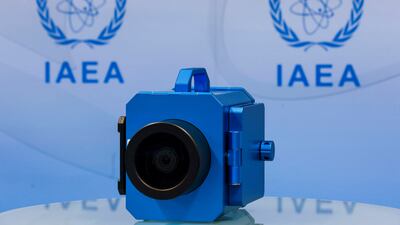Iran has said it will keep UN-installed monitoring cameras at nuclear sites switched off until a new deal on its programmes can be struck, state media reported the head of the country's Atomic Energy Organisation as saying on Monday.
The UN body that monitors nuclear programmes, the International Atomic Energy Agency, installed monitoring equipment at sites where uranium was being enriched to agreed upon levels following the 2015 nuclear deal, known as the Joint Comprehensive Plan of Action.
In 2018, former US president Donald Trump pulled out of the deal, which had relaxed sanctions in exchange for UN monitoring of nuclear sites.
Atomic Energy Organisation of Iran
The US reimposed sanctions, but the European Union and Britain tried to keep the deal alive, and some monitoring equipment remained at Iranian nuclear sites.
On Monday, Iranian nuclear chief Mohammad Eslami said Iran would not agree to address reportedly unexplained uranium traces, as demanded by the IAEA, and added that the 2015 nuclear deal had cleared Tehran of “possible military dimensions” (PMD) allegations.
Iran says its nuclear programme is for civilian purposes only.
In June, the IAEA's 35-nation board of governors overwhelmingly passed a resolution criticising Iran for failing to explain uranium traces found at three undeclared sites.
“The claimed PMD cases and locations were closed under the nuclear accord and if [the West is] sincere, [it] should know that closed items will not be reopened,” Mr Eslami was quoted by state media as saying.
“The basis of the nuclear accord was a response to these alleged cases.”
Iran informed the agency that it had removed its equipment, including 27 cameras installed under the 2015 deal, after it passed the resolution criticising Tehran.
“We will not turn on the IAEA cameras until the other side returns to the nuclear deal,” Mr Eslami said.
“We will decide about the … cameras added under the nuclear deal after the westerners return to the accord and we are sure they won't do anything mischievous.”
Iran's foreign ministry spokesman Nasser Kanaani on Monday accused IAEA chief Rafael Grossi of having “unprofessional, unfair and unconstructive views” on Tehran's nuclear programme.
The programme is “galloping ahead” and the agency has very limited visibility on what is happening, Mr Grossi said in an interview published on Friday.
Western powers say Iran is getting closer to being able to sprint towards making a nuclear bomb. Indirect talks between Iran and the US on reviving the deal have been stalled since March.
The nuclear pact seemed near revival, but talks were thrown into disarray partly over whether the US would remove Iran's Islamic Revolutionary Guard Corps from its list of foreign terrorist organisations.
The IRGC controls elite armed and intelligence forces that Washington has accused of running a global terrorism campaign.
US President Joe Biden's administration has made clear it has no plan to drop the IRGC from the list, a step that would have limited practical effect but which would anger many in Congress.









